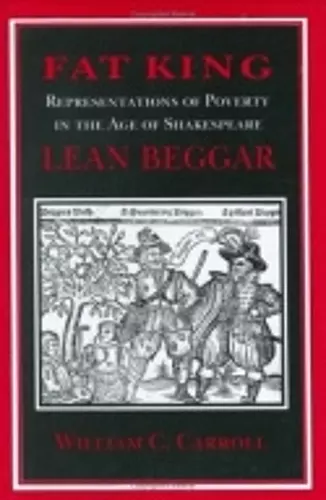Fat King, Lean Beggar
Representations of Poverty in the Age of Shakespeare
Format:Hardback
Publisher:Cornell University Press
Published:8th Feb '96
Currently unavailable, and unfortunately no date known when it will be back

Investigating representations of poverty in Tudor-Stuart England, Fat King, Lean Beggar reveals the gaps and outright contradictions in what poets, pamphleteers, government functionaries, and dramatists of the period said about beggars and vagabonds. William C. Carroll analyzes these conflicting "truths" and reveals the various aesthetic, political, and socio-economic purposes Renaissance constructions of beggary were made to serve.
Carroll begins with a broad survey of both the official images and explanations of poverty and also their unsettling unofficial counterparts. This discourse defines and contains the beggar by continually linking him with his hierarchical inversion, the king. Carroll then turns his attention to the exemplary case of Nicholas Genings, perhaps the single most famous beggar of the period, whose machinations as fraudulent parasite and histrionic genius were chronicled by Thomas Harman. Carroll next assesses institutional responses to poverty by considering two hospitals for the destitute, Bridewell and Bedlam, and their role as real and symbolic places in Elizabethan drama.
Fat King, Lean Beggar then focuses on dramatic inscriptions of poverty, primarily in Shakespeare's plays. Carroll's analysis of The Taming of the Shrew and The Winter's Tale links the tradition of the merry beggar to the socioeconomic forces of the day; and his reading of King Lear makes a case for the uniqueness of Edgar, the Bedlam beggar, in the history of drama. Carroll also considers later plays such as Fletcher and Massinger's Beggars' Bush and Richard Brome's Jovial Crew to show how idealizations of the beggar ironically equate him with a monarch in his supposed freedom.
William Carroll's Fat King, Lean Beggar is a fascinating as well as functional survey of the ways in which the period understood and rationalized the presence of the poor in their midst.... Carroll has set before us in compelling detail the minds and motives of privileged early modern Englishmen as they tried to understand and cope with the poverty that surrounded them.
* Journal of English and Germanic Philology *Carroll convincingly argues that Lear and other plays address a real and pressing social division within Stuart England.
-- Steve Mentz * Shakespeare Newsletter *Carroll's enlightening investigation... reveals convincingly the gaps and contradictions between what the dramatists, poets, pamphleteers or government functionaries presented as the truth about beggars and vagabonds.... It is a pleasure to read his subtle and well-demonstrated argument.
* Anglia *Every student of Shakespeare will want to read this important book.
* Shakespeare QuarterISBN: 9780801431852
Dimensions: 229mm x 152mm x 24mm
Weight: 907g
256 pages